Abstract
1. The effects of vasoactive intestinal polypeptide (VIP) antagonists [AC-Tyr1, D-Phe2]-GRF(1-29)-NH2 and [4-Cl-D-Phe6, Leu17]-VIP on excitatory neuroeffector transmission in the dog and cat trachea were investigated by use of microelectrode, double sucrose-gap and tension recording methods. 2. In the dog trachea, repetitive stimuli at high frequency (20 Hz) markedly enhanced the amplitude of contraction, the amplitude of contractions evoked by 50 stimuli at 20 Hz relative to that evoked by 5 stimuli being 14.2 +/- 3.8 times (n = 7, +/- s.d.). In the cat, the summation was much less marked, the amplitude of contractions evoked by 50 stimuli relative to that evoked by 5 stimuli being only 2.1 +/- 0.6 times (n = 5, +/- s.d.). Neither VIP antagonist had any effect on the relationship between the number of stimuli at 20 Hz and the relative amplitude of contraction in the dog trachea, but did enhance the amplitude of contractions to 1.1-1.5 times control in the cat trachea. 3. VIP antagonists dose-dependently enhanced the amplitude of excitatory junction potentials (e.j.ps) evoked by a single stimulus in the cat trachea, without changing the resting membrane potential or input membrane resistance of the smooth muscle cells. However, neither antagonist had any effect on the amplitude of the e.j.p. in the dog trachea. 4. Neither VIP antagonist had any effect on the post-junctional response of smooth muscle cells to exogenously applied acetylcholine (ACh; 10(-9)-10(-5) M) in the dog or cat trachea.(ABSTRACT TRUNCATED AT 250 WORDS)
Full text
PDF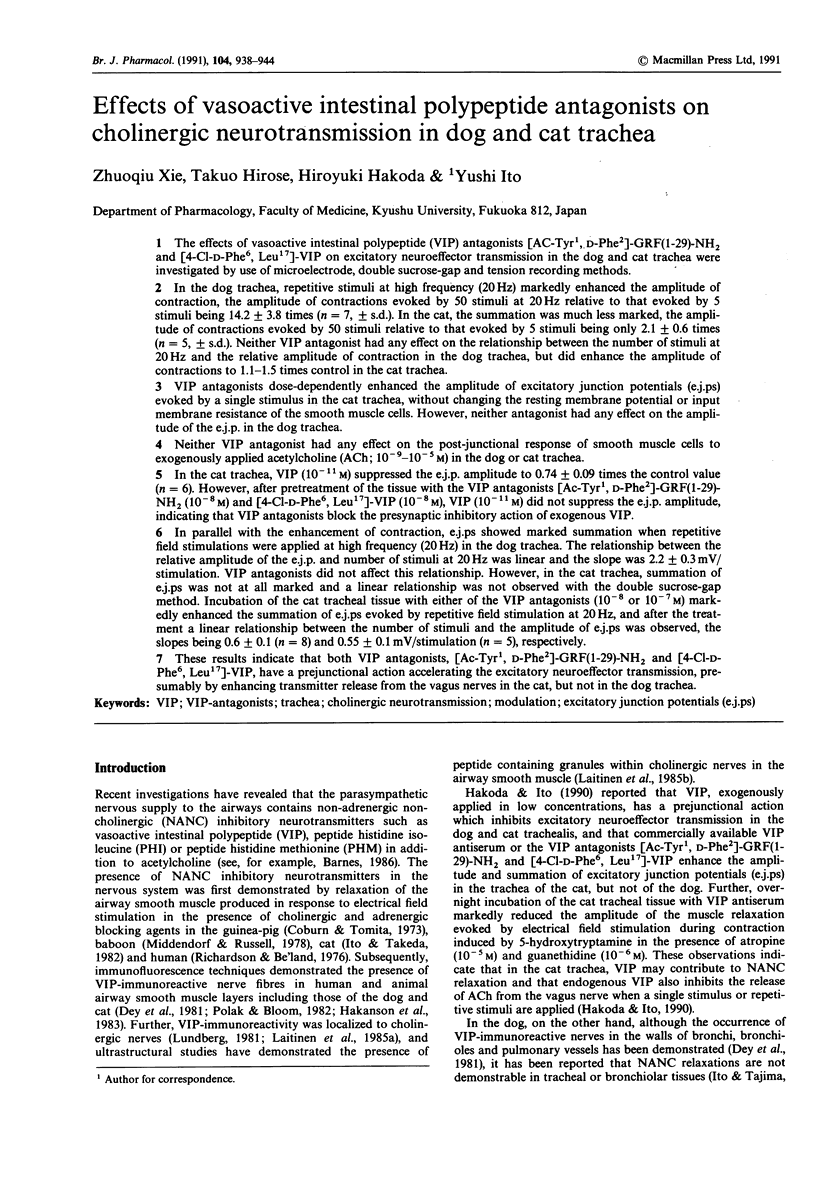
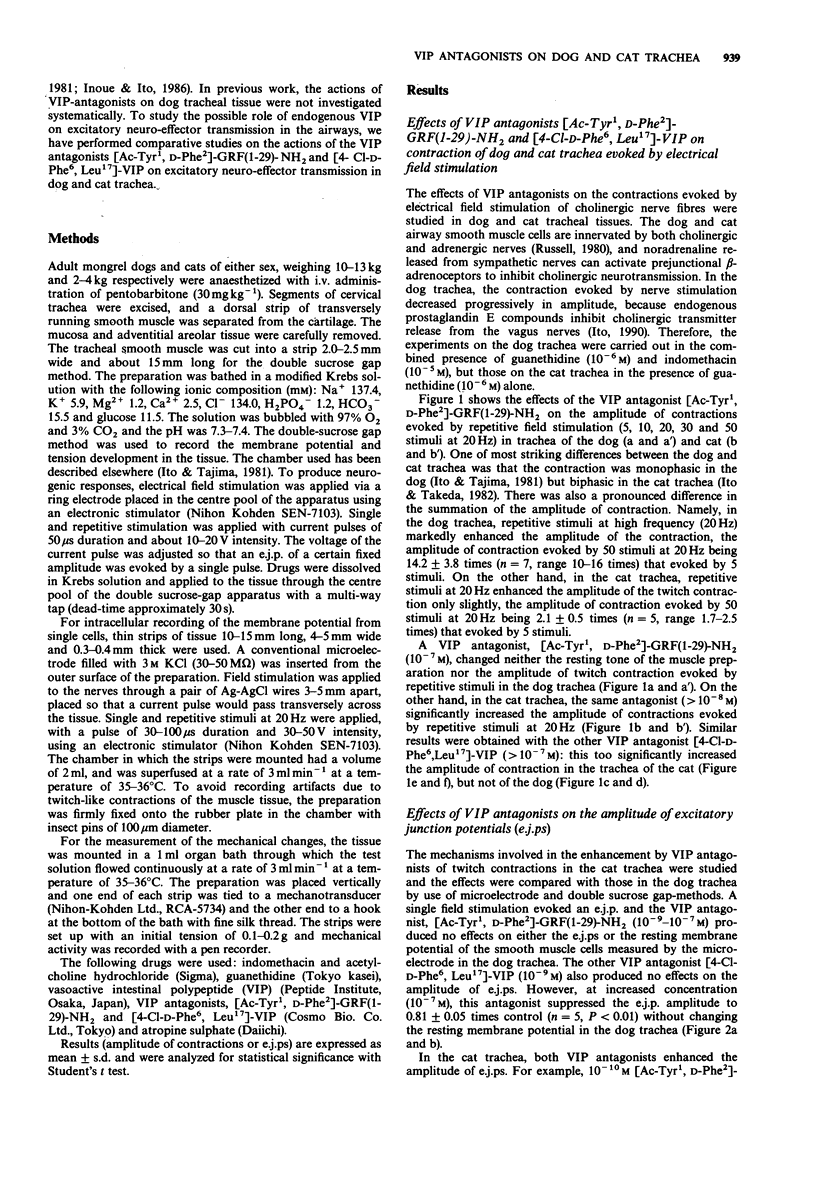
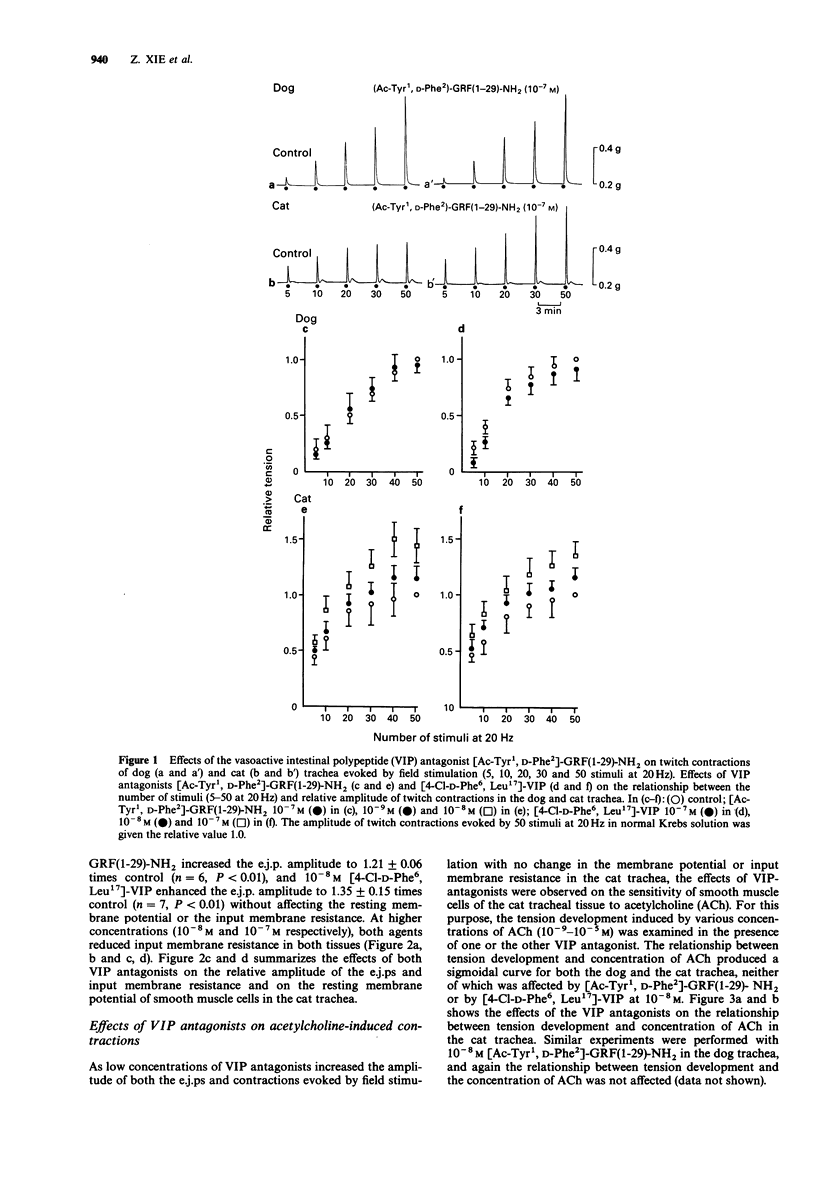
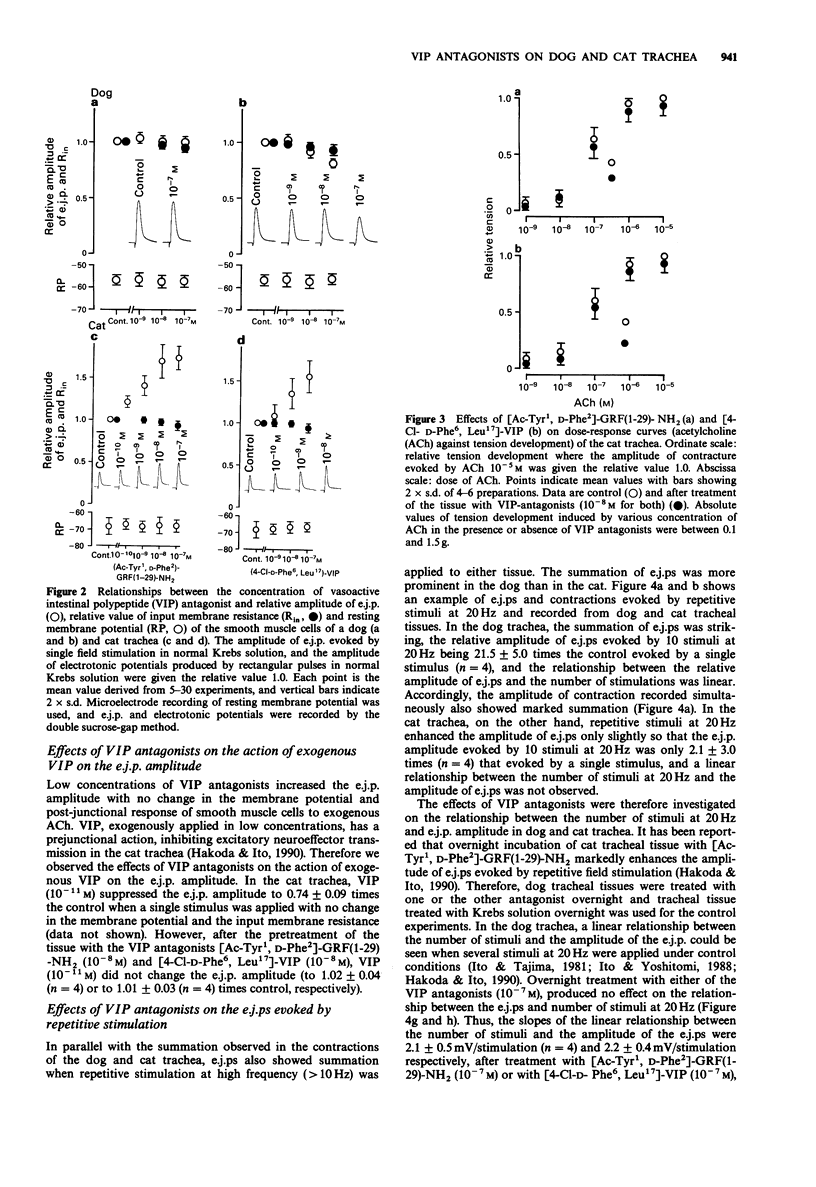
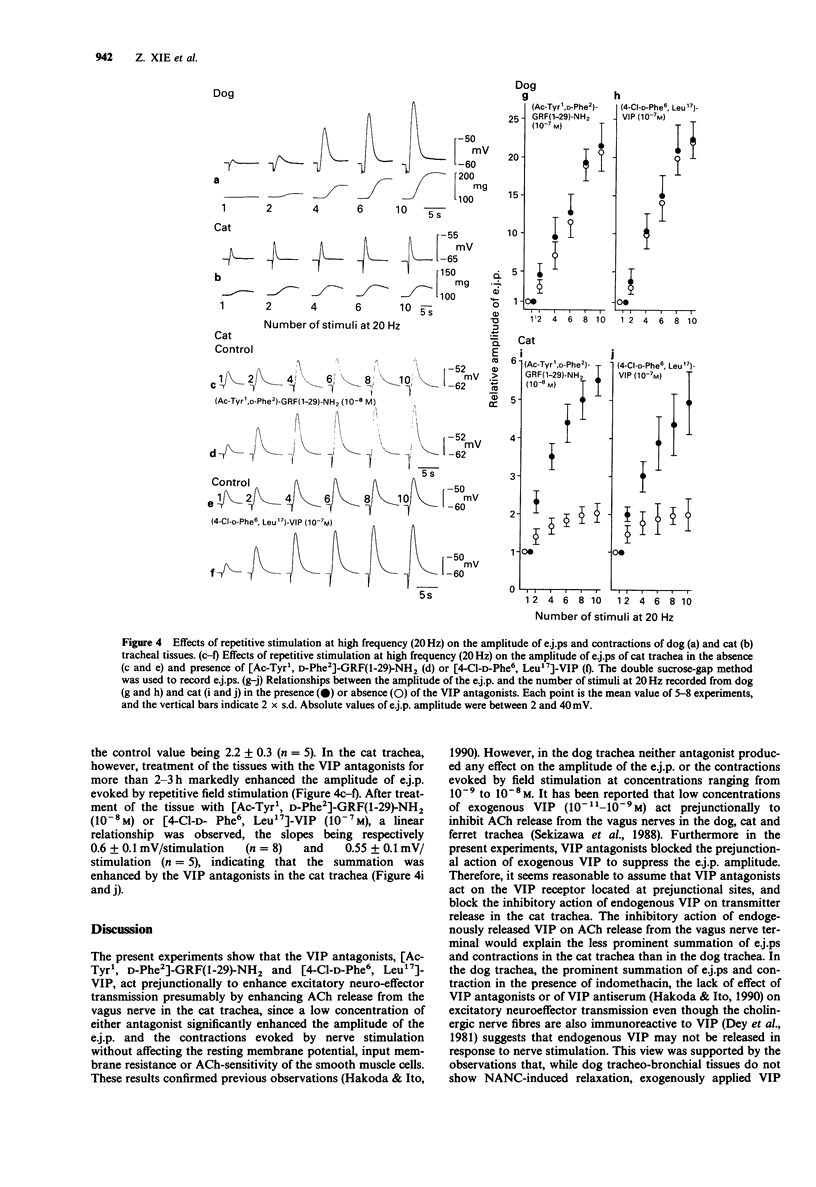
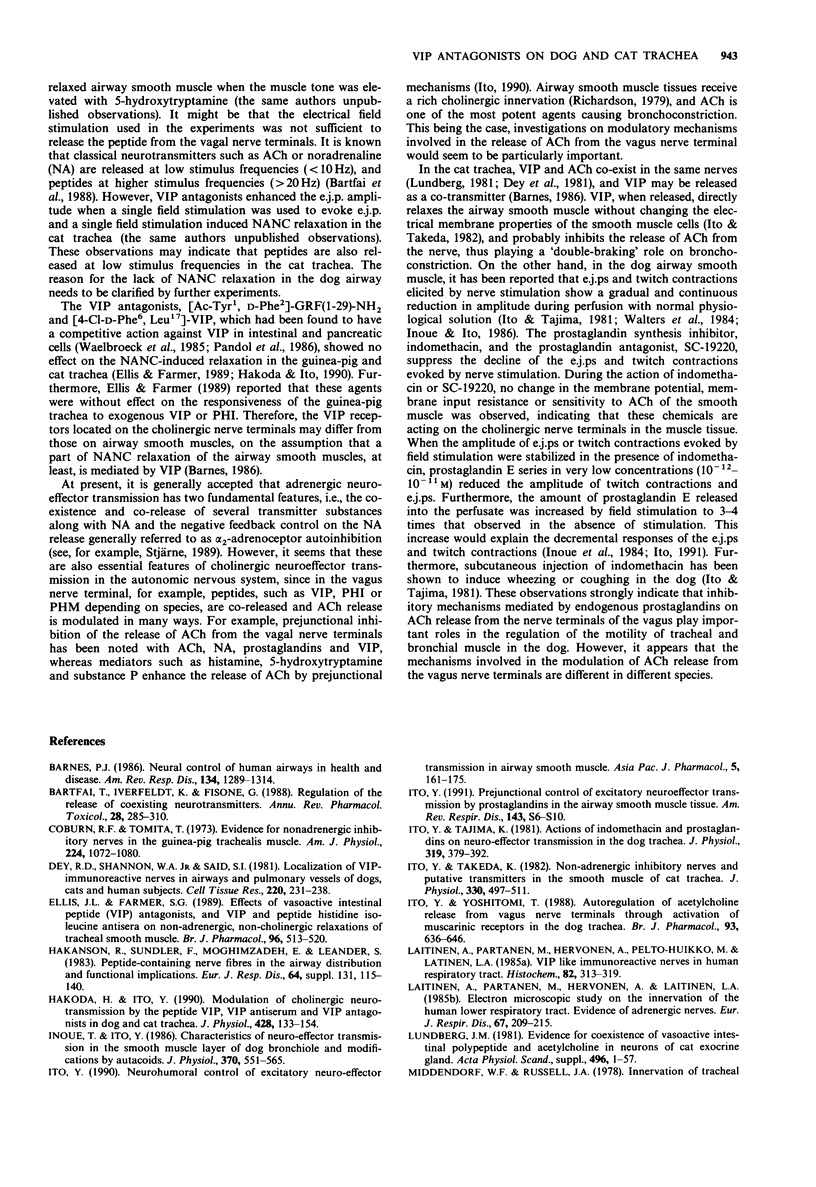
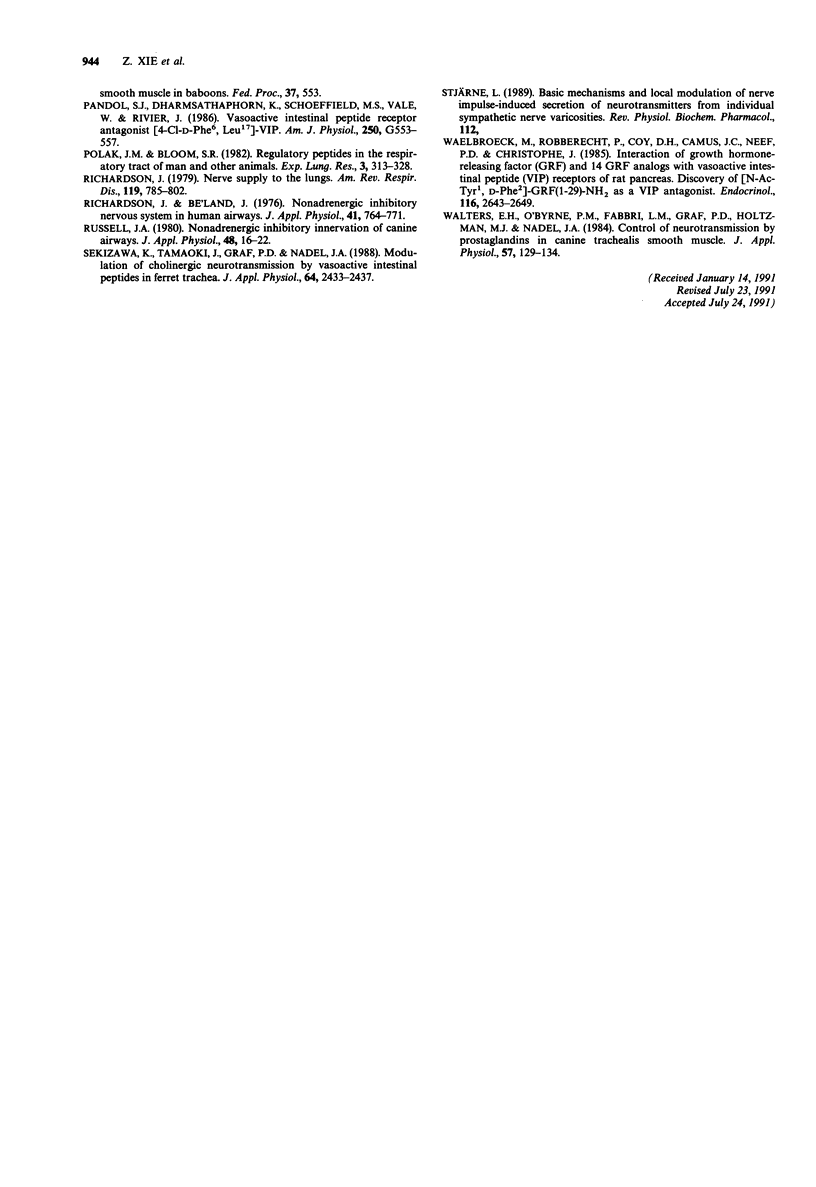
Selected References
These references are in PubMed. This may not be the complete list of references from this article.
- Barnes P. J. Neural control of human airways in health and disease. Am Rev Respir Dis. 1986 Dec;134(6):1289–1314. doi: 10.1164/arrd.1986.134.5.1289. [DOI] [PubMed] [Google Scholar]
- Bartfai T., Iverfeldt K., Fisone G., Serfözö P. Regulation of the release of coexisting neurotransmitters. Annu Rev Pharmacol Toxicol. 1988;28:285–310. doi: 10.1146/annurev.pa.28.040188.001441. [DOI] [PubMed] [Google Scholar]
- Coburn R. F., Tomita T. Evidence for nonadrenergic inhibitory nerves in the guinea pig trachealis muscle. Am J Physiol. 1973 May;224(5):1072–1080. doi: 10.1152/ajplegacy.1973.224.5.1072. [DOI] [PubMed] [Google Scholar]
- Dey R. D., Shannon W. A., Jr, Said S. I. Localization of VIP-immunoreactive nerves in airways and pulmonary vessels of dogs, cat, and human subjects. Cell Tissue Res. 1981;220(2):231–238. doi: 10.1007/BF00210505. [DOI] [PubMed] [Google Scholar]
- Ellis J. L., Farmer S. G. The effects of vasoactive intestinal peptide (VIP) antagonists, and VIP and peptide histidine isoleucine antisera on non-adrenergic, non-cholinergic relaxations of tracheal smooth muscle. Br J Pharmacol. 1989 Mar;96(3):513–520. doi: 10.1111/j.1476-5381.1989.tb11847.x. [DOI] [PMC free article] [PubMed] [Google Scholar]
- Hakoda H., Ito Y. Modulation of cholinergic neurotransmission by the peptide VIP, VIP antiserum and VIP antagonists in dog and cat trachea. J Physiol. 1990 Sep;428:133–154. doi: 10.1113/jphysiol.1990.sp018204. [DOI] [PMC free article] [PubMed] [Google Scholar]
- Håkanson R., Sundler F., Moghimzadeh E., Leander S. Peptide-containing nerve fibres in the airways: distribution and functional implications. Eur J Respir Dis Suppl. 1983;131:115–140. [PubMed] [Google Scholar]
- Inoue T., Ito Y. Characteristics of neuro-effector transmission in the smooth muscle layer of dog bronchiole and modifications by autacoids. J Physiol. 1986 Jan;370:551–565. doi: 10.1113/jphysiol.1986.sp015950. [DOI] [PMC free article] [PubMed] [Google Scholar]
- Ito Y., Tajima K. Actions of indomethacin and prostaglandins on neuro-effector transmission in the dog trachea. J Physiol. 1981;319:379–392. doi: 10.1113/jphysiol.1981.sp013915. [DOI] [PMC free article] [PubMed] [Google Scholar]
- Ito Y., Takeda K. Non-adrenergic inhibitory nerves and putative transmitters in the smooth muscle of cat trachea. J Physiol. 1982 Sep;330:497–511. doi: 10.1113/jphysiol.1982.sp014355. [DOI] [PMC free article] [PubMed] [Google Scholar]
- Ito Y., Yoshitomi T. Autoregulation of acetylcholine release from vagus nerve terminals through activation of muscarinic receptors in the dog trachea. Br J Pharmacol. 1988 Mar;93(3):636–646. doi: 10.1111/j.1476-5381.1988.tb10321.x. [DOI] [PMC free article] [PubMed] [Google Scholar]
- Laitinen A., Partanen M., Hervonen A., Laitinen L. A. Electron microscopic study on the innervation of the human lower respiratory tract: evidence of adrenergic nerves. Eur J Respir Dis. 1985 Sep;67(3):209–215. [PubMed] [Google Scholar]
- Laitinen A., Partanen M., Hervonen A., Pelto-Huikko M., Laitinen L. A. VIP like immunoreactive nerves in human respiratory tract. Light and electron microscopic study. Histochemistry. 1985;82(4):313–319. doi: 10.1007/BF00494059. [DOI] [PubMed] [Google Scholar]
- Lundberg J. M. Evidence for coexistence of vasoactive intestinal polypeptide (VIP) and acetylcholine in neurons of cat exocrine glands. Morphological, biochemical and functional studies. Acta Physiol Scand Suppl. 1981;496:1–57. [PubMed] [Google Scholar]
- Pandol S. J., Dharmsathaphorn K., Schoeffield M. S., Vale W., Rivier J. Vasoactive intestinal peptide receptor antagonist [4Cl-D-Phe6, Leu17] VIP. Am J Physiol. 1986 Apr;250(4 Pt 1):G553–G557. doi: 10.1152/ajpgi.1986.250.4.G553. [DOI] [PubMed] [Google Scholar]
- Polak J. M., Bloom S. R. Regulatory peptides and neuron-specific enolase in the respiratory tract of man and other mammals. Exp Lung Res. 1982 Nov;3(3-4):313–328. doi: 10.3109/01902148209069660. [DOI] [PubMed] [Google Scholar]
- Richardson J. B. Nerve supply to the lungs. Am Rev Respir Dis. 1979 May;119(5):785–802. doi: 10.1164/arrd.1979.119.5.785. [DOI] [PubMed] [Google Scholar]
- Richardson J., Béland J. Nonadrenergic inhibitory nervous system in human airways. J Appl Physiol. 1976 Nov;41(5 Pt 1):764–771. doi: 10.1152/jappl.1976.41.5.764. [DOI] [PubMed] [Google Scholar]
- Russell J. A. Noradrenergic inhibitory innervation of canine airways. J Appl Physiol Respir Environ Exerc Physiol. 1980 Jan;48(1):16–22. doi: 10.1152/jappl.1980.48.1.16. [DOI] [PubMed] [Google Scholar]
- Sekizawa K., Tamaoki J., Graf P. D., Nadel J. A. Modulation of cholinergic neurotransmission by vasoactive intestinal peptide in ferret trachea. J Appl Physiol (1985) 1988 Jun;64(6):2433–2437. doi: 10.1152/jappl.1988.64.6.2433. [DOI] [PubMed] [Google Scholar]
- Waelbroeck M., Robberecht P., Coy D. H., Camus J. C., De Neef P., Christophe J. Interaction of growth hormone-releasing factor (GRF) and 14 GRF analogs with vasoactive intestinal peptide (VIP) receptors of rat pancreas. Discovery of (N-Ac-Tyr1,D-Phe2)-GRF(1-29)-NH2 as a VIP antagonist. Endocrinology. 1985 Jun;116(6):2643–2649. doi: 10.1210/endo-116-6-2643. [DOI] [PubMed] [Google Scholar]
- Walters E. H., O'Byrne P. M., Fabbri L. M., Graf P. D., Holtzman M. J., Nadel J. A. Control of neurotransmission by prostaglandins in canine trachealis smooth muscle. J Appl Physiol Respir Environ Exerc Physiol. 1984 Jul;57(1):129–134. doi: 10.1152/jappl.1984.57.1.129. [DOI] [PubMed] [Google Scholar]


